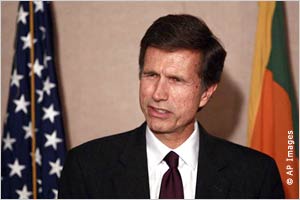
U.S. embassy and consulate websites or www.state.gov.
We’ve gone social!
Follow us on our facebook pages and join the conversation.
15 March 2011
For Peace in Sri Lanka, Reconciliation Must Accompany Prosperity

Washington — Sri Lanka’s government needs to hold accountable those who committed injustices and abuses during the country’s civil war and work to create a political climate that will facilitate healing and durable peace, a senior Obama administration official says.
Speaking in New York at the Asia Society March 14, Assistant Secretary of State for South and Central Asian Affairs Robert Blake said that after decades of conflict between the government and Tamil rebels, Sri Lanka is showing great economic and developmental promise that can benefit its whole population, but national reconciliation is critical to the country’s success.
“Economic prosperity and development are necessary but not sufficient conditions for lasting peace and healing,” Blake said. “The solution for lasting peace needs to include not just economic opportunity, but a political climate in which every Sri Lankan feels he or she has an equal stake in the country’s future and the ability to realize his or her potential in an open and just society.”
Blake said that perhaps the most critical action the government can take is to provide a full accounting of the whereabouts of individuals who are missing or in detention so that their families can know the status of their loved ones.
“The Sri Lankan government told the diplomatic community that it has compiled a database that will assist in the efforts to locate missing persons. We hope that families of those missing or detained will have access to this database,” he said.
National reconciliation requires either charging or releasing people who remain in custody, Blake said. He added that he hopes the panel formed by the Sri Lankan attorney general’s office will soon examine and expedite the cases of all those who are detained.
He said accountability “is an essential part of any reconciliation process.” Allegations of killings, injustices and abuses that occurred during the conflict must be investigated “no matter which side committed them,” and those who committed them must be brought to justice, Blake said. The primary responsibility for implementing a “credible and independent” accountability process “lies with Sri Lanka itself.”
“Our strong preference is that the Sri Lankan government establish its own transparent process that meets international standards. However, in the absence of such a mechanism, there will be mounting pressure for an international mechanism,” he said.
The Obama administration welcomes President Mahinda Rajapaksa’s appointment of the Lessons Learnt and Reconciliation Commission (LLRC) and the establishment of the Interagency Advisory Committee to implement the LLRC’s interim recommendations as “an important step in the reconciliation process,” Blake said.
The LLRC has heard testimony from hundreds of Sri Lankans, and its work is expected to conclude in May. Blake said he hopes the LLRC’s final report “will be made public and will include strong recommendations for national reconciliation.” He encouraged the LLRC and the Sri Lankan government to consult with Sri Lankan Tamils and other minority communities to “find a way to resolve the often conflicting and tangled claims to land in former conflict zones so families may rebuild their lives.”
Blake said the United States “has not wavered in our support for the people of Sri Lanka” and since 2009 has given nearly $62 million in food aid, which has provided most of the nourishment for the estimated 250,000 people who were displaced at the end of the conflict. It has also given $11 million to support, train and equip demining efforts in Sri Lanka, which have cleared more than 5 million square meters of mine-infested land in the northern provinces of Sri Lanka and destroyed more than 25,000 land mines and unexploded ordnance.
The United States is helping to create 20,000 full-time jobs in the north and east of the country through partnerships between the U.S. Agency for International Development (USAID) and private companies, providing English language instruction to youth in rural areas, and giving grants to help youth organizations establish IT centers and promote science and technology, Blake said. He added that the United States “is the largest single importer of Sri Lankan goods worldwide, purchasing 22 percent of its exports,” and U.S. entrepreneurs “are the largest investors in Sri Lankan bonds and other financial instruments.”
The Obama administration “is ready to continue helping the Sri Lankans to restore their country, and there is still a great deal to be done,” Blake said. “The end of the conflict presents an opening for everyone that is a friend and partner of the country to help realize the dream of opportunity for all Sri Lankans.”
(This is a product of the Bureau of International Information Programs, U.S. Department of State. Web site: http://www.america.gov)